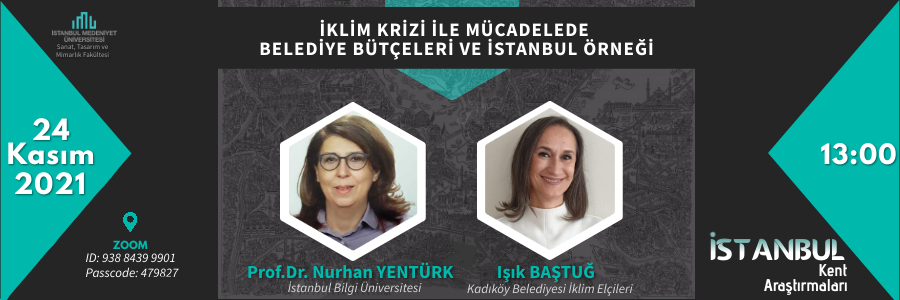The 26th seminar of the “Istanbul Urban Studies” seminar series organized by the Department of Urban and Regional Planning of Istanbul Medeniyet University moderated by Res.Asst. Ayça ÇELİKBİLEK was held online on Wednesday, 24 November 2021. Prof. Dr. Nurhan YENTURK from Istanbul Bilgi University and Işık BAŞTUĞ, Kadıköy Municipality Climate Ambassadors Coordinator, presented their study titled “İklim Krizi ile Mücadelede Belediye Bütçeleri ve İstanbul Örneği” (Municipal Budgets in the Fight against Climate Crisis and the Case of Istanbul). The researchers shared the results of their research report published in November 2021 titled ‘Türkiye’de Çevre Koruma ve İklim Değişikliği ile Mücadeleye Ayrılan Kamu Kaynaklarının İzlenmesi’ (Monitoring of Public Fundings Allocated to Fight Against Environmental Protection and Climate Change in Turkey) via their presentation.
Işık BAŞTUĞ started her presentation by reminding that most countries including Turkey will be facing an extensive ecocide and climate-related disasters in near future. She further added that lack of climate change related policies of central and local bodies is the main factor creating this situation. However, Baştuğ mentioned that legal agreements and financial aids for implementing adaptation and mitigation policies to fight against global climate crisis are encouraging steps for the future. The researcher remarked that Turkey is a signatory to the Paris Treaty and is also a part of some other important formations. However, she added that it should be remembered not only the goals and promises but also the budgets allocated for policies are almost equally crucial.
Baştuğ said that she analyzed the public expenditures run by municipalities and their co-partners to fight against environmental protection and climate change under 4 categories; renewable energy usage and energy efficiency-based mitigation management; adaptation expenses, waste management and other expenses like nature protection, environmental awareness training and environmental management.
Evaluating the results of the study, Prof. Dr. Nurhan YENTURK pointed out that allocated budgets of 14 metropolitan municipalities for environmental protection and climate change have been decreasing since 2018 and melting due to the high inflation rate. She said that Istanbul has the highest budget allocated for environmental protection and climate change, which is almost equal to the total sum of other municipalities’ budgets in Istanbul and 4 times bigger than Ankara´s. She underlined that although Istanbul Metropolitan Municipality´s budget shares taken from its subsidiaries vary, IMM´s income consists of mostly land sales since 2018. YENTURK explained the budget according to research items and said that the highest rate is dedicated to waste management, which was followed by adaptation and mitigation projects.
Baştuğ evaluated Kadıköy Municipality´s related budget and said that ¾ of the budget is allocated for cycle route construction, solar energy usage and waste-free street projects, all of which serve as mitigation projects. The researcher mentioned that the following expenses are air quality measurement, climate-based early warning systems and adaptation projects including green areas and other expenses. She attributed the reasons why waste management is the lowest budget item to long-established applications like mobile waste and waste sorting which have been run for about a decade.
In the following q/a session, a couple of controversial issues were discussed. Firstly, the efficiency of strategies run by local government to fight against the climate crisis and their integration with urban planning were discussed. Later on, municipal expenses and their contribution to climate action goals was probed along with alternatives to grass areas in an environmental protection strategy centered on water use efficiency. The last discussion was about the potential changes in climate action expenditures which might be faced due to inflation and increasing exchange rates.


